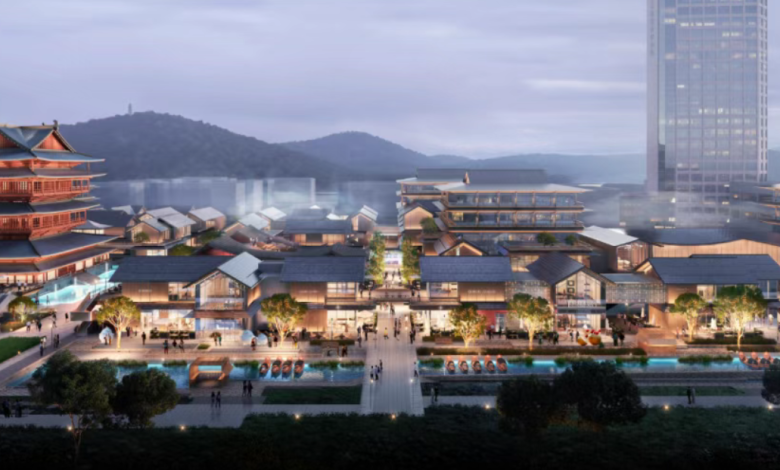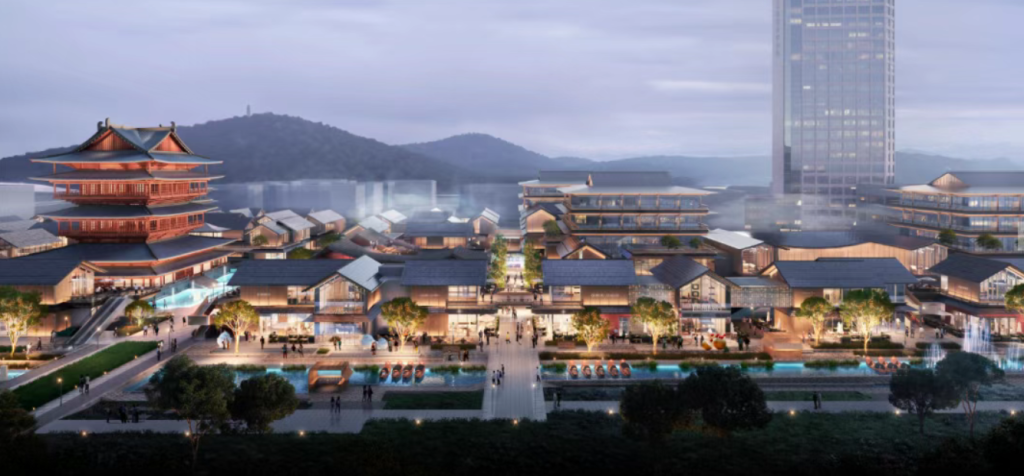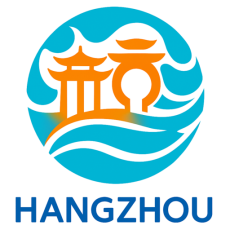

Introduction: A Fusion of History and Modernity
Hangzhou, a city renowned for its rich history and dynamic urban development, is set to welcome a new cultural-commercial landmark—Wuyueli. With a construction area of 72,000 square meters and 17 buildings, this project is poised to become a must-visit destination for both locals and tourists. Inspired by Chengdu’s famed Taikoo Li, Wuyueli blends Wu-Yue cultural heritage with contemporary commercial vitality, creating a unique “culture-commerce-tourism” experience.
As someone who has explored similar heritage-inspired developments like Shanghai’s Xintiandi and Nanjing’s Laomendong, I can confidently say that Wuyueli has the potential to redefine urban leisure in Hangzhou. Slated for completion in 2026, this project is already generating buzz for its innovative approach to preserving history while embracing modernity.
The Vision Behind Wuyueli: Bridging Past and Present
Wuyueli is not just another commercial complex—it’s a key component of the Wu-Yue Kingdom Archaeological Site Park, which has been under development since 2018. The project follows a “one street, three zones” masterplan, with Wuyueli serving as the historical-cultural commercial street.
What makes Wuyueli special is its dual identity:
- Historical Legacy: Named after the Wu-Yue Kingdom (907–978 AD), it pays homage to the region’s deep-rooted traditions.
- Modern Flair: Borrowing elements from Taikoo Li, it introduces first-in-market stores, concept shops, and pop-up experiences to attract younger demographics.
In my experience, successful cultural-commercial projects strike a balance between authenticity and innovation. Wuyueli seems to achieve this by integrating ancient architecture with trendy retail, ensuring it appeals to history buffs and fashion-forward visitors alike.
Key Attractions: What to Expect at Wuyueli
1. The Iconic Wenchang Pavilion
A standout feature of Wuyueli is the Wenchang Pavilion, a reconstructed historical site originally built during the Ming Dynasty. According to local records, it was once an educational hub before being destroyed in wars.
The new pavilion maintains traditional aesthetics with:
- A three-story, five-eaved wooden structure
- Elevators and staircases for accessibility
- Interactive digital exhibits and a tea house
I personally recommend visiting at night when the pavilion is illuminated, offering a breathtaking view reminiscent of Hangzhou’s Chenghuang Pavilion.
2. Nantan Theater: Where History Meets Contemporary Art
Adjacent to the pavilion, the Nantan Theater will host performances ranging from stand-up comedy to “Blossoms on the Path”, a musical based on Wu-Yue history. This space exemplifies how Wuyueli merges cultural storytelling with modern entertainment.
3. The Archaeological Park Link
A stone bridge connects Wuyueli to the Yijincheng Archaeological Park, where visitors can explore Tang-Song Dynasty relics, including ancient walls and moats. The surrounding waterfront bars and cafés add a lively contrast to the historical ambiance.
Why Wuyueli Could Rival Taikoo Li
While Taikoo Li in Chengdu is famous for its luxury brands and open-air plazas, Wuyueli differentiates itself with:
- Stronger cultural immersion (e.g.,非遗/non-heritage workshops)
- More historical landmarks (Wenchang Pavilion, archaeological park)
- Localized retail (featuring Hangzhou-based designers)
From a visitor’s perspective, Wuyueli’s advantage lies in its authentic storytelling. Unlike generic malls, every corner here reflects Wu-Yue heritage, making it a true cultural destination.
Final Thoughts: A Must-Visit from 2026 Onward
With construction set to finish in 2026, Wuyueli is on track to become Hangzhou’s next iconic landmark. Whether you’re a history enthusiast, a foodie, or a shopaholic, this project promises something for everyone.
If you’re planning a trip to Hangzhou in the coming years, keep an eye on Wuyueli’s progress. Based on the renders and early buzz, it might just surpass even Shanghai’s Xintiandi in blending culture with commerce.
What do you think? Would you visit Wuyueli for its history, shopping, or both? Share your thoughts in the comments!




